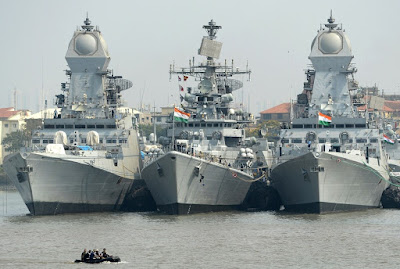New Delhi: India plans to invite Australia to join the annual Malabar naval exercise that has so far included just Japan and the U.S., in a move that could risk China’s ire.
The decision to include Australia in the drills — the first time all members of the regional grouping known as the Quad will be engaged at a military level — comes as Beijing and New Delhi are caught up in their worst border tensions in four decades. The exercise will bring together the navies of India, Japan, Australia and the U.S. in the Bay of Bengal at the end of the year, according to senior Indian officials who asked not to be identified, citing rules.
New Delhi is expected to clear the way next week for a formal invitation to Australia following final government clearance and consultations with the U.S. and Japan, the officials said.
“The timing of India potentially letting Australia into Malabar would be especially significant at this juncture,” said Derek Grossman, researcher at the Washington-based RAND Corporation who worked in the U.S. intelligence community for more than a decade. “It would send a significant message to China that the Quad — U.S., Australia, Japan, and India — are de facto conducting joint naval exercises, even if not technically conducted under the auspices of a Quad event.”
China has been uncomfortable with the informal coalition of four democracies, which was first formed in 2004 to help nations in the Indo-Pacific after the tsunami and revived in 2017. Post the coronavirus pandemic, the grouping has been coordinating efforts every month with Vietnam, South Korea and New Zealand.
Indian Navy Spokesperson Commander Vivek Madhawal declined to comment.
A spokesperson for Australia’s defense department said in an emailed statement on Friday that while the nation was yet to receive an invitation to Exercise Malabar, “Australia sees value in participating in quadrilateral defense activities in order to increase interoperability and advance our collective interests in a free, open and prosperous Indo-Pacific region.”
Strengthening Ties
While the Malabar exercises between U.S. and Indian navies were instituted in 1992, they have been more regular since 2004 with other Asian nations joining in the annual event. China had objected to the only other time Australia participated in the drills along with India, Japan, U.S. and Singapore in 2007.
India’s inclusion of Australia this year follows a defense agreement and upgrading ties to a Comprehensive Strategic Partnership. The Mutual Logistics support agreement announced in May by Prime Ministers Narendra Modi and Scott Morrison allows access to each other’s bases and ports. India has a similar agreement with the U.S.
Canberra’s inclusion in the games was “only a matter of time” given improving defense and economic ties, according to Biren Nanda, former Indian High Commissioner to Australia and senior fellow at Delhi Policy Group. Australia’s merchandise trade with India for the year ended June 2019 was A$21.1 billion ($14.5 billion), according to Australia’s Department of Foreign Affairs and Trade.
“There’s no direct relation between inviting Australia and what’s happening at the Sino-Indian border,” said Nanda in a phone interview. “This was a natural progression. Yet the question will be raised: how would the Chinese regard this? And they will react negatively. Just like they had done earlier.”
























0 Comments